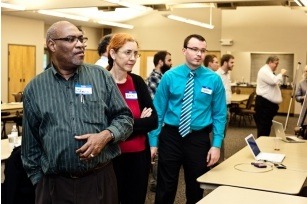Crossposted from Center for Rural Strategies
Rural broadband advocates from five states and Washington D.C. gathered in rural Eastern Kentucky on Tuesday, October 11, 2011, for the first Rural Broadband Summit, cosponsored by the Center for Media Justice, the Center for Rural Strategies, and Free Press.
The purpose of the summit is to examine rural broadband issues, such as the lower levels of access and use among rural areas and ways the nation might lower cost and improve service to rural users.
Twenty-seven people participated in the gathering, representing groups working in arts and culture, health care, higher education, tribal issues, community development, and community organizing. They were from Kentucky, Virginia, Tennessee, West Virginia, California, and Washington, D.C.
“This is a unique mixture of people and groups,” said Edyael Casaperalta of the Center for Rural Strategies. “And it underscores how broadband affects so many different parts of our communities – economic development, education, health care, civic engagement, and cultural expression.”
Rural communities lag the rest of the nation in broadband access and access speeds. Rural communities are likely to have fewer Internet providers and have slower download and upload speed, according to an Daily Yonder analysis of data collected by the FCC and NTIA.
Participants discussed a variety of policy solutions for improving broadband. “There are some rural areas where a government subsidy could help bring in private providers,” said James Patterson of the West Virginia Partnership of African American Churches. But there are other rural areas where providing service will never be attractive to private enterprise. “In those places there has to be an alternative,” like some kind of public access, he said.
Others advocated increasing competition by encouraging municipal and nonprofit networks in rural communities, an approach that is similar to electrical and telephone cooperatives that wired much of rural America after private enterprise had stopped expanding their networks to those areas.
Others compared broadband to a basic necessity, such as water.
“We can’t just wait until providing Internet broadband to some rural communities becomes profitable,” said Mark Kidd of Appalshop. “What if we had waited until it was profitable before we ran water and electricity to some rural areas?”
Organizers of the event said the concerns they heard about rural telecommunications were similar to what they heard in other parts of the nation.
“The stories we heard today, mirror those we’ve heard in other areas: outrageous prices, poor service, decreased choice and few consumer protections are just some of the challenges community members face when it comes to the Internet,” said amalia deloney of the Center for Media Justice. “Rural communities are looking to the FCC to protect their interests–especially as they reform the Universal Service Fund and consider the proposed acquisition of T-mobile by AT&T. It’s clear that rural shouldn’t shoulder any more costs.”
The Universal Service Fund is a federal mechanism that helps defray the costs of telephone service to hard-to-serve areas. The Federal Communications Commission is considering changes to the fund to allow it to help lower cost for broadband access, as well.
Misty Perez of Free Press said large telecommunications corporations needed to do more to serve rural communities with broadband. “Broadband access is crucial to rural communities, which are among some of the hardest hit in the economic downturn,” she said. “But Internet service providers’ empty promises are not going to get Americans connected. We need real investment spurred by competition, and policies that put consumers ahead of the bottom line.
“Access to fast, affordable internet service is what will help rural communities participate in the modern economy, not a bunch of hot air and promises that can’t be enforced.”
The second day of the broadband event was a public hearing on broadband policy. Jonanthan Adelstein, director of the USDA Rural Utilities Service, which directs broadband and other infrastructure programs, attended.




